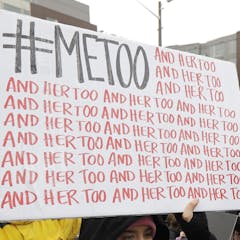
Articles on Sexual abuse
Displaying 1 - 20 of 231 articles

The division between ‘pro-sex’ and ‘anti-porn’ feminists hasn’t done much to keep women safe from exploitation via porn – both real and AI-generated.

Our research shows it is not unusual for young people to harass and abuse their peers.

Evidence suggests that some individuals who hurt animals likewise act violently toward women and girls. Exploring that overlap can help prevent gender-based violence and animal abuse.

As #Metoo continues to unfurl in France, men are now also speaking up against abuse they experienced. The Conversation sat down with the country’s first sociologist researching this phenomenon.

A harrowing and important depiction of a male victim of sexual abuse.

Luis Rubiales’ non-consensual kiss of Spanish soccer star Jenni Hermoso is far from an isolated incident – new research shows gender-based violence is still highly prevalent in sport.

Emotional, violent and sexual abuse are rife at an age when victims are scarred for life.

Documenting Spain’s #metoo moment, the film articulates women’s fury at the deeply entrenched sexism and misogyny that permeates Spanish society and culture.

Survivors of gender-based abuse can often feel retraumatized by the justice system. But simple acts of validation and support can make a meaningful difference and restore a sense of agency.

Crimes of the Cross tells how clergy and leaders in the Anglican Diocese of Newcastle covered up allegations, protected abusive priests and failed to care for survivors.

Non-disclosure agreements have been used to keep victim-survivors from speaking up. Despite guidelines addressing this, new research shows such agreements remain standard practice.

There’s nothing surprising about the fake explicit images going viral. It happens to women celebrities frequently – but anyone can be targeted.

Dassi Erlich details the crime, the cover-up and her eventual victory in court against Malka Leifer, the former school principal who abused her.

With therapy and social support, children and adults who experienced child sexual abuse can regain a sense of control over their lives.

It’s time we stop treating young people’s experiences in digital and physical spaces as distinct and mutually exclusive.

The complainants say CSIS’s internal complaint procedure is deficient, leaving people who complain open to reprisals without access to outside assistance.

The security situation in Haiti must change – but another UN intervention may not be the way this happens.

A royal commission into sexual abuse in Aboriginal communities is not the way to address abuse against Aboriginal children. Indigenous-led solutions are needed.

To develop meaningful solutions, sexual harassment needs to be seen as an organizational issue and not just an interpersonal one.

In minority faith groups that already face hate, women who have experienced harassment sometimes fear bringing negative attention to their community.





